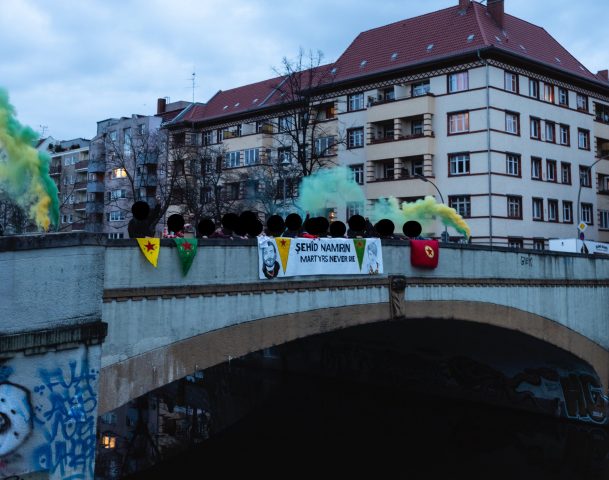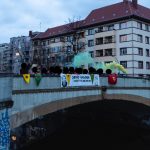şehid namirin – martyrs never die!

(German below)
Today in Berlin we remembered the internationalist comrades who died defending the Revolution in Rojava.
We did so on the anniversary of death of Lorenzo Orsetti, Tekoser Piling, who died two years ago in Baghuz, in northeast Syria, few days after the death of Anna Campbell, Hêlîn Qereçox, on March 15th, 2018 in Afrin.
Lorenzo and Anna, as well as other internationalists, were in Rojava not only to support the Kurdish people against the attacks by Isis and Turkey, but also to defend Democratic Confederalism, a project of coexistence based on self-determination, struggle against patriarchy and ecology.
We did this in solidarity with those who, among the internationalists, have returned and are, as of today, subjects to state repression. The criminalization, also carried out by the medias, stigmatizes those who have taken up arms and fought Isis as socially dangerous, preventing them from continuing their political activity.
This is happening while European states, Germany and Italy first, continue to support both economically and militarily Turkey, Daesh‘ abetter and jailer of Abdullah Öcalan, the main inspirer behind the Kurdish revolution in Rojava, who has been held in complete isolation since 1999.
şehid namirin – martyrs never die!
——-
Heute haben wir in Berlin den internationalistischen Genoss*innen gedenkt, die ihr Leben für die Verteidigung der Revolution in Rojava geopfert haben.
Das haben wir am Todestag von Lorenzo Orsetti, Tekoser Piling, und wenige Tage nach dem von Anna Campbell, Hêlîn Qereçox, gemacht. Tekoser Piling starb vor zwei Jahren in Baghuz, Nordostsyrien, Hêlîn Qereçox am 15. März 2018 in Afrin.
Wie andere Internationalist*innen waren sie in Rojava nicht nur darum, um das kurdische Volk gegen die Angriffe von Isis und der Türkei zu verteidigen, sondern auch um den Demokratischen Konföderalismus zu unterstützen, ein gesellschaftliches Projekt, das auf Selbstbestimmung, Ökologie und Kampf gegen das Patriarchat basiert.
Das haben wir aber auch in Solidarität mit den anderen Internationalist*innen gemacht, die zurückgekehrt sind und nun der staatlichen Repression ausgesetzt sind.
Die politische Kriminalisierung, die auch von den Medien geführt wird, stigmatisiert diejenigen, die zu den Waffen gegriffen und gegen Isis gekämpft haben, als gefährliche Subjekte und hindert sie nach ihr Rückkehr ins eigene Land daran, weiterhin politisch aktiv zu sein.
Dies geschieht, während europäische Länder, allen voran Deutschland und Italien, weiterhin nicht die kurdische Bewegung unterstützen, sondern die Türkei, die Komplize von Daesh ist und die Abdullah Öcalan, der die kurdischen Revolution von Rojava inspiriert hat, seit 1999 in völliger Isolation hält.
şehid namirin – martyrs never die!
passiert am 18.03.2021


